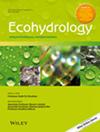Substantial Decline in the Groundwater in the Ten Kongduis Basin in the Loess Plateau During 2001–2020
Abstract
The Loess Plateau has experienced obvious greening because of anthropogenically induced vegetation restoration. However, the impact of ecological restoration on groundwater storage over the past two decades remains unclear, though it is widely known that the growth of plants in this region depends heavily on groundwater. Such a knowledge gap is partly due to the scarcity of groundwater monitoring data. Here, this study reconstructed the groundwater level records in a typical basin in the Loess Plateau (the Ten Kongduis basin) spanning from 2001 to 2020 using an emergent relationship between the cumulative surface water fluxes over a 12-month moving window and the groundwater level changes. The long-term reconstruction suggests a persistent decreasing trend in the groundwater level from 2001 to 2020, with a short period of recovery observed between 2011 and 2013. In particular, the declining trend notably intensified after 2013, indicating an accelerated depletion of groundwater in the most recent few years. Further attribution analysis suggests that the decrease in groundwater levels was primarily attributed to the increasing evapotranspiration because of extensive vegetation restoration. Additionally, the development and utilization of regional groundwater resources also play an important role in this phenomenon. Our results provide crucial insights into the management and utilization of groundwater resources in the Loess Plateau, thus highlighting that a more sustainable strategy for future adaptation must be planned in this water-scarce region.

 求助内容:
求助内容: 应助结果提醒方式:
应助结果提醒方式:


